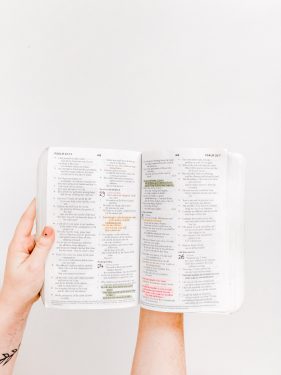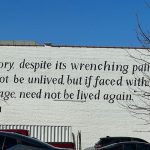The forty-day season of Lent begins on Ash Wednesday, March 2nd. All Christians are invited “to the observance of a holy Lent, by self-examination and repentance; by prayer, fasting, and self-denial; and by reading and meditating on God’s holy Word” (BCP, p. 265).
This Lent, what are we doing—or not doing—so that we might more deeply engage in “learning to love God, one another, and all creation?” We asked you, and you told us! Folks from all over the Diocese of Central New York wrote in to share some of your favorite Lenten resources for individuals and congregations.
We’d love to hear from you, too! How will you be praying, listening to others, building relationships, speaking with integrity, sharing your life of faith, and responding to God’s love in the upcoming Lenten season? Please tell us in the comments so we can all learn together.
The Word in the Wilderness
 “This Lent, I’m planning to work my way through Malcolm Guite’s poem-a-day program in his book The Word in the Wilderness. Last year, I found his similar book for Advent, Christmas & Epiphany (Waiting on the Word) rich & rewarding.
“This Lent, I’m planning to work my way through Malcolm Guite’s poem-a-day program in his book The Word in the Wilderness. Last year, I found his similar book for Advent, Christmas & Epiphany (Waiting on the Word) rich & rewarding.
Guite—a poet & Episcopal priest—sets his mission by asking, “Why might we want to take time in Lent to immerse ourselves in poetry, to ask for the poets as companions on our journey with the Word through the wilderness?” To answer he quotes Seamus Heaney, that poetry “offers a clarification, a fleeting glimpse of a potential order of things ‘beyond confusion’, a glimpse that has to be its own reward.”
I’m hopeful that Guite’s program of poetry & commentary will deepen my Lenten reflections.”
—Richard Reinhold, member of The Episcopal Church at Cornell and leader on the diocesan Creation Care Initiative team
One Year Bible
 “I had stopped reading the One Year Bible. Why? I couldn’t tell you but I know I got a lot out of it. I plan on starting that again even though the days won’t match up. I also plan on giving up computer games and social media to devote more time to being more present, to be able to hear where God is leading (or sometimes pushing) me. I intend to take better care of myself and others. Hopefully these changes will stick.”
“I had stopped reading the One Year Bible. Why? I couldn’t tell you but I know I got a lot out of it. I plan on starting that again even though the days won’t match up. I also plan on giving up computer games and social media to devote more time to being more present, to be able to hear where God is leading (or sometimes pushing) me. I intend to take better care of myself and others. Hopefully these changes will stick.”
—Gail Jones, member of St. Matthew’s Episcopal Church in Liverpool and Speak Faith 2022 small group leader
Learning to Pray
 “The book that I will be reading during Lent is called Learning to Pray: A Guide for Everyone. The author is James Martin, S.J.
“The book that I will be reading during Lent is called Learning to Pray: A Guide for Everyone. The author is James Martin, S.J.
The book is in a sense a guide on how to pray to God. The author describes his own experiences on his journey and acts as a guide for the reader. The book shows and explains how to deepen your prayer life that you have with God or tries to help establish one. The author offers many helpful tips. It is an interesting way of exploring. I am reading it because I was stuck with the current way that I was praying. I never really had formal instruction on how to pray and never had helpful hints growing up. This is helping me get back to the basics and on a better path to deepen my connection with God.”
—Kathy Walklett, member of Trinity Episcopal Church in Fayetteville
For the Life of the World
 “St. David’s [Episcopal Church in Dewitt] is planning an in-person series of sessions (Tuesday evenings, with a simple supper). We’ll be reading the book For the Life of the World, by Alexander Schmemann.
“St. David’s [Episcopal Church in Dewitt] is planning an in-person series of sessions (Tuesday evenings, with a simple supper). We’ll be reading the book For the Life of the World, by Alexander Schmemann.
Schmemann was an orthodox priest, and For the Life of the World is a basic sacramental theology, explaining how worship and mission are intertwined for the Orthodox tradition. Schmemann argues that worship presents the created order back to God in an act of joy and love. It is this love that heals the rift between creation and Creator. The worship of the Church trains us to see the love of God at work in the world (that’s where it fits into the diocesan Rule/Vision/Mission — a world healed by love, and Learning to love God, each other and all creation).
—The Rev. Dan Handschy, rector of St. David’s Episcopal Church in DeWitt
Climate Church, Climate World
 “Climate Church, Climate World” is a compelling book to engage people and congregations in the imperative of why churches need to lead on climate care. The Rev. Jim Antal has devoted his ministry to this challenge and opportunity to learn why, how, and where we can make a difference in caring for our earthly home. The book has nine chapters with discussion questions at the end of each. It’s an effective tool for getting people engaged in the movement of climate justice and climate care.”
“Climate Church, Climate World” is a compelling book to engage people and congregations in the imperative of why churches need to lead on climate care. The Rev. Jim Antal has devoted his ministry to this challenge and opportunity to learn why, how, and where we can make a difference in caring for our earthly home. The book has nine chapters with discussion questions at the end of each. It’s an effective tool for getting people engaged in the movement of climate justice and climate care.”
—Kip Coerper, GreenFaith Fellow, leader on the diocesan Creation Care Initiative, and organist and choirmaster for St. James’ Episcopal Church in Skaneateles
Editor’s note: Our diocesan Creation Care Initiative brought the Rev. Jim Antal to speak last fall on the topic, “The Imperative of Faith Communities to Lead on Creation Care.” A recording of his talk is here.
How To Do Nothing

P.S. If How to Do Nothing catches your eye, you might also want to check out “Non-Working Title,” a new podcast by Episcopal priest Ethan Lowery, who works with young adults and college students in Fredericksburg, VA. Partially inspired by Odell’s book, the podcast is “an on-going conversation with friends about rest, sabbath, and resisting the overbearing cultural pressure to work/produce/be available all the time.”
—The Rev. Meredith Kadet Sanderson, diocesan staff member
In Search of Paul
 “I plan on spending time studying the life, writing, and teaching of St. Paul. Perhaps the most zealous of the apostles, and not accepted by the 11 as a genuine apostle, Paul came to shape much of what we, in Western Christianity, quote to each other, or, rather often, misquote or misinterpret, because we lack an intimate understanding of the world in which he lived. Also, with his writings having been “extended” by later writers with specific aims, not always in line with what Paul demonstrably wrote, including complete letters under his name but not by his pen, we are reading his message at best through a glass darkly. I am trying to get a deeper understanding of what he was truly trying to tell us, and accomplish in his missionary travels.
“I plan on spending time studying the life, writing, and teaching of St. Paul. Perhaps the most zealous of the apostles, and not accepted by the 11 as a genuine apostle, Paul came to shape much of what we, in Western Christianity, quote to each other, or, rather often, misquote or misinterpret, because we lack an intimate understanding of the world in which he lived. Also, with his writings having been “extended” by later writers with specific aims, not always in line with what Paul demonstrably wrote, including complete letters under his name but not by his pen, we are reading his message at best through a glass darkly. I am trying to get a deeper understanding of what he was truly trying to tell us, and accomplish in his missionary travels.
I could do this any time of the year obviously, but I’m doing this deliberately during Lent, to redirect my mind away from daily noise and toil to gain a deeper understanding and appreciation of our faith.
I’ve previously read Sarah Ruden’s Paul Among the People (the link takes you to bookshop.org, supporting your local independent bookseller) and during Lent I will work through J. D. Crossan and J. L. Reed’s In Search of Paul (this link takes you to bookshop.org, supporting your local independent bookseller; alternatively, Barnes & Noble also has it).”
—Peter Koeppel, member of Trinity Memorial Episcopal Church in Binghamton and leader on the diocesan Creation Care Initiative and Stewardship Resources Team
Lent Madness
 “For your Lenten spiritual exercises, you might enjoy Lent Madness, an online “play-off” tournament experience, using saints and holy people from throughout history. It’s modeled on March Madness, that iconic play-off for sports.
“For your Lenten spiritual exercises, you might enjoy Lent Madness, an online “play-off” tournament experience, using saints and holy people from throughout history. It’s modeled on March Madness, that iconic play-off for sports.
Lent Madness was originally the brainchild of the Rev. Tim Schenck of Massachussetts in 2010. After a couple of years, he joined forces with the Rev. Scott Gunn, executive director of Forward Movement. Each of the days of Lent features a vote between two of the “contenders.” It narrows down over the days of Lent from 32 saints to the Saintly Sixteen, then the Elate Eight, the Faithful Four and finally, to a “saintly smackdown” and the winner receives the “Golden Halo.”
You can go to LentMadness.org and beginning March 3rd, the day after Ash Wednesday, and ending the Wednesday of Holy Week, you can vote for the saint you think deserves to move forward. You’ll have a chance to read and learn about some saints that you might not have known before and some familiar ones. Surprises abound. The back-and-forth comments are hilarious. The self-appointed “Supreme Executive Committee” (Revs. Tim and Scott) banter and drop puns by the bushel-full—pretty entertaining too. There are “celebrity bloggers’ who write the biographies which get more and more interesting and far-afield as they progress in the “play-off.” The Very Rev. Megan Castellan, from St. John’s Episcopal in Ithaca, is one of the celebrity bloggers, so we know someone who’s famous! The site is already up and moving toward this year’s Lent Madness with Monday Madness, so I invite you to check it out.”
—The Rev. Pat Kinney, priest of St. John’s Episcopal Church in Speedsville
How will you observe Lent in 2022?
Explore even more resources for Lent at episcopalchurch.org/lent-resources. But before you go, drop a comment and tell us about your favorite Lenten resource or your plans for Lent 2022!
-
[…] This Lent, how will you draw closer to the God who created you, loves you, and calls you into fullness of life? Tell us in the comments, or if you need some ideas for a Lenten practice, please check out our favorite Lenten resources for 2022. […]



I love Lent Madness! It has humor but you do learn a lot about spiritual people you may not be aware of. I also like anything by John Dominic Crossan.